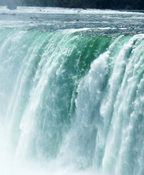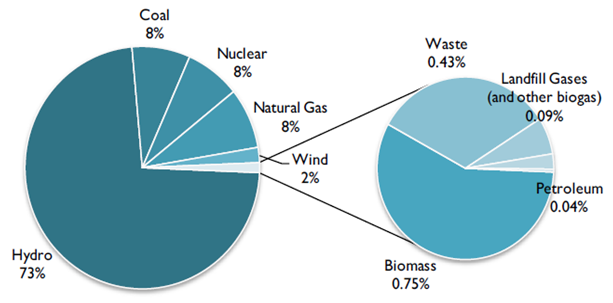Clean energy is a good thing. Who in their right mind would want dirty energy? Whatever your political stripe it's one thing everybody agrees about.
This is a good read, better yet the facts check out. Yes, critics may say it comes from a politician, but Ericksen's kinda unique. He received a bachelor’s degree in government from Cornell University, and a master’s degree in political science and environmental policy from Western Washington University. He's no slouch where it comes to finding solutions.

by WA Senator Doug Ericksen
Hello Whatcom County,
Electricity is absolutely vital to our daily lives. If a tragedy struck and one of our major roadways was shut down, services could be provided while the road was rebuilt. On the other hand, if the electrical grid were to fail, our society could collapse within a matter of days.
I use this example not to provoke fear, but rather to underscore the importance of our state approaching energy policy in a rational, forward-thinking manner. With this week's Blueprint for a Better Washington, we'll look at what we're doing right on energy, and where fresh ideas could keep electricity costs low and our energy grid reliable, while encouraging innovations to move us towards energy independence.
The facts:
- 81 percent of the power produced in Washington comes from clean sources
- 73 percent comes from hydroelectric
- 8 percent comes from nuclear
- Washington has the 3rd lowest retail electricity cost in the U.S.
- Washington has the 9th smallest carbon footprint in the U.S.
The problem:
- Washington's Renewable Portfolio Standards mandate that a percentage of energy come from "renewable sources", but fails to recognize hydroelectric power as renewable
- Examples of eligible renewable sources allowed by the measure include wind, solar and biomass
- Utilities are mandated to increase the percentage of power they provide to customers derived from renewable sources to 15 percent by 2020
- The current renewable requirement is three percent
- As utilities increase the amount of power generated from less efficient sources, the cost of power increases and reliability decreases
The solution - my guiding principles for energy policy in Washington state:
- Focus first on cost to the consumer - technology should lead to lower prices, not higher costs for families
- Keep a level playing field that encourages innovation - provide tax incentives for all energy producers to become more efficient instead of allowing government to pick winners and losers
- Invest in research and development - provide resources for our universities to develop new technologies
Clean, reliable and inexpensive - what's powering Washington
Currently, our state enjoys reliable and affordable power from a mix of sources that is the envy of many states in the nation. As you can see in the below chart, the vast majority of the power generated in Washington comes from clean sources like hydro and nuclear that emit no greenhouse gases.
Hydroelectric power is clean, affordable and reliable. The sun doesn't always shine and the wind doesn't always blow, but our rivers run constantly. Nuclear energy is similarly reliable and affordable.
Renewable Portfolio Standards - social engineering for energy
With good intentions, Washington adopted Renewable Portfolio Standards to encourage investments in alternative energy sources. Of course, the devil is always in the details and as the RPS was further studied, two things became obvious. First, the law deliberately excluded hydroelectric power, despite the fact that hydro provides reliable, clean and cost-efficient energy. Second, moving to less-efficient energy sources such as solar and wind power would raise utility bills - perhaps substantially.
Every year since the RPS was adopted, legislation has been brought forward to modify the standards. Those efforts have all been met with stiff resistance from supporters of the law who insist that moving to new energy sources is worth the higher utility bills and less reliable power. Here are the phased-in targets utilities must hit for usage of energy from eligible renewable sources such as solar and wind:
The irony is that states like California are purchasing our hydropower to meet their renewable energy standards. If the RPS goes unchanged, we'll be selling more clean hydroelectric energy to other states, only to replace it with alternative sources that are more expensive, less reliable and no more environmentally friendly. It just doesn't make any sense.
Encouraging innovation everywhere - leveling the playing field
Government shouldn't be in the businesses of picking winners and losers in any industry, much less one as crucial as energy. On the federal level, we've seen the pitfalls of selective government investment with the now-infamous example of Solyndra, the alternative energy company that received $535 million in taxpayer subsidies and promptly declared bankruptcy.
To be clear, tax incentives are available for traditional energy suppliers, such as oil companies, to expand and update existing facilities. The difference is that oil companies pay billions in taxes each year. By comparison, alternative energy producers working in wind or solar power receive so much in subsidies that their operations pay little or no taxes.
We know that incentives are a more effective tool than mandates for changing behavior. State government should be providing tax incentives for all energy producers to become more efficient and move us closer to being energy independent.
A real-world problem - and a positive solution
This isn't just an abstract issue; it's playing out across the state right now. As an example, Benton Public Utility District in Eastern Washington has plenty of power to meet its needs for years to come, but due to our Renewable Portfolio Standards, it will need to spend between $1.5 million and $3 million each year for energy produced elsewhere that qualifies as renewable under the law. Instead of the utility buying hydropower that costs around $28 per megawatt-hour, it will have to buy wind power that runs between $75 and $125. Of course, the PUD doesn't absorb the difference, it has to pass it onto customers in the form of higher rates.
Fortunately, awareness of the issue is being raised and people are coming together in an attempt to change the law and allow some flexibility by recognizing hydroelectric power as a renewable resource. Below is a link to a Tri-City Herald article that details a September press conference held by POWER, a regional group trying to build consensus for common-sense energy policy.
http://www.tri-cityherald.com/2012/09/28/2116893/mid-columbia-group-forms-to-fight.html#storylink=misearch
The fact is that we need a long-term vision for energy independence based on today's realities. Currently, many alternative energy sources cost more, are less reliable and require significant government subsidies. In the next session, I'll be sponsoring legislation that will:
- Modify Washington's Renewable Portfolio Standards to recognize hydropower as renewable
- Keep utility bills at our relatively-low rates
- Maintain our reliable energy production
- Invest in nuclear energy and energy grid improvements
- Fund research and development of emerging technology through our universities
Stay in touch
Thanks for your continued interest in improving state government. I appreciate all the feedback I've received and I always welcome your thoughts, questions or concerns. Feel free to contact me by email at [email protected] or by phone at my Olympia office at (360) 786-7682. It's an honor to be working for the people of Whatcom County and representing you in the state Senate.
Take care and God bless,
Doug Ericksen
Washington State Senator, 42nd District
Olympia office: (360) 786-7682
E-mail: [email protected]
Web site: www.SenatorEricksen.com



 RSS Feed
RSS Feed
